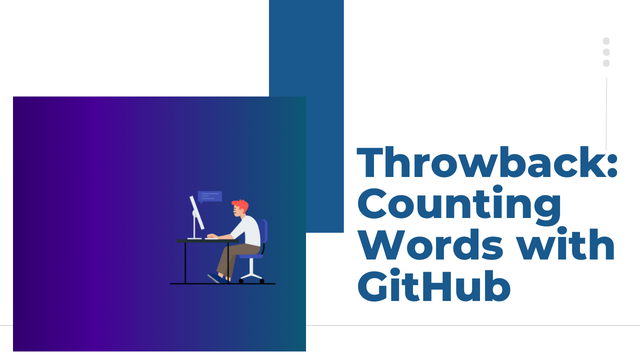Throwback: Counting Words with GitHub
GitHub is an essential feature for any programmer in the contemporary world-it is a place for code collab, versioning, and sharing open-source project. And besides these core purposes, several projects have sprung up, harnessing GitHub for building and sharing tiny scripts or tools aimed at accomplishing everyday tasks. One of such tasks is counting the words in a document or body of text. Counting a word may sound a simple task. However, it may get quite complicated, surprising you at times. For example, it’s easy to count words in a plain text file, but if you’re counting words in a complicated way with respect to the language differences, punctuations, and formatting, there lies a challenge. GitHub offers that flexible relief where you can build and share with everyone.
The Journey of Word Counting Tools: From Ancient to Modern Days
The early days of programming and the current state of development are very different, particularly concerning word-counting tools. You now found developers in the early days scripting small programs capable of reading a text file and counting the number of words composed in that file, usually in a very simple way, like reducing the text to a matrix of words and just taking the count of this matrix. This does not hold the same correctness with more complex creations: indeed, accents and hyphens tend to trip systems up.
Fast forward today, and you can find a plethora of tools available for counting words, all hosted on GitHub-each equipped with a unique offering. Some tools are tied to particular programming languages while others can be used universally across multiple languages. These tools have been developed to care about the different types of punctuation, special characters, and all the different forms of counting words so that it fits more closely actual word usage.
It will help you understand how GitHub aids word-counting applications development.
GitHub extends several benefits in the creation and sharing of word-counting tools such as collaboration on a project. Developers have the possibility to create repositories on word-counting scripts and allow others to add features, fix bugs, or suggest improvements. GitHub also offers versioning with great importance in tracking all the changes that have occurred and maintaining the word-counting algorithm to be accurate as new features are added.
Some of the most famous projects on GitHub concerning word counts include:
1. wc: word-count tools, which count the words, characters, and lines in text files. Simple scripts of this nature find their way into the hands of most developers processing large datasets.
2. Natural Language Processing (NLP) Tools: Advanced word counting is created for the developers to work with NLP techniques to count the words by taking words morphology, word stems, and even named entities into account to provide a more meaningful and accurate result from the counting process.
3. Command-line Utilities: There are many programmers who would rather do things from the command line, and GitHub contains many different command-line utilities for word counting. Most of these are lightweight and easily incorporated into other scripts or workflows.
The Future of Word Counting on GitHub
As text and language take on an increasing part of the digital world, so the requirement for better and better accurate word count should grow with it. What it creates is such fostering collaboration between developers not only to improve the tool today, but future tools that may become available. Further into the future would be advanced word counting tools that use machine learning and artificial intelligence to help improve accuracy, particularly in the context of complicated text analysis and natural language processing.
This may also change with new integration and tools that GitHub will internalize over time. This would allow users to do the same integration and access of word counting in their everyday developmental workflows-whether for content, code, or even SEO optimization.
conclusion,
while word counting may have started as a simple task, it has evolved into a dynamic problem that can benefit greatly from the collaborative and open-source nature of GitHub.
ALSO READ THIS: On GitHub, there is a lot in the way of Tetris Java Source Code.


